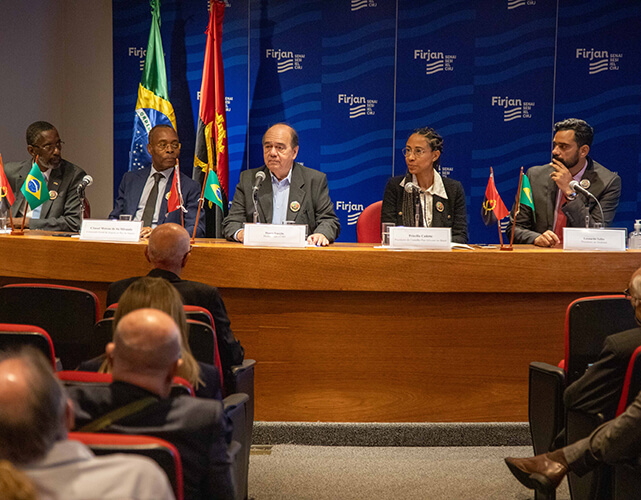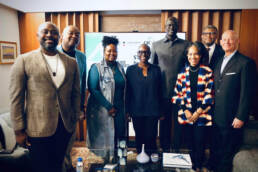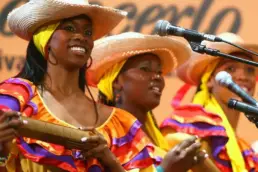
Rio de Janeiro, Brazil – [November 26, 2024]
* Translated from Firjan
The Pan-African Council’s Brazil Chapter presented at the Brazil-Angola Business Connections Forum: Perspectives and Opportunities, held at the Firjan headquarters and brought together businesspeople and public authorities from both countries this November to discuss the expansion of bilateral business. Firjan CIRJ director Mauro Varejão recalled that Brazil already exports plastic, granite and other products to the African country, but that there are many opportunities to increase the flow of bilateral trade.
“We have historical and cultural ties with Angola, especially the language, which facilitates trade negotiations. Brazil was the 15th destination for Angolan exports. We have the potential to expand this flow. I hope the forum inspires many businesses,” highlighted Varejão, who is also President of the Union of Marble, Granite and Related Rock Industries of the State of Rio de Janeiro (Simagran).
The Angolan Consul General in Rio de Janeiro, Mateus de Sá Miranda, also reinforced the idea of the union of the two countries due to historical and cultural ties and recalled that Brazil was the first to recognize Angola’s independence, in 1975. “Angola was an agricultural country, one of the largest producers of coffee and cotton, and became a major exporter of oil. The Angolan government has established priorities to diversify the economy. Take advantage of the opportunity to do business in Angola, which is open to all who wish to invest,” encouraged the Consul General.
Also participating in the opening were the presidents of the Union of Refrigeration, Heating and Air Treatment Industries of the State of Rio de Janeiro (Sindratar), Leonardo Salles; of the Angola-Brazil Chamber of Commerce, Industry, Tourism, Science, Technology and Culture (CCAB), Nayt Júnior; and of the Pan-African Council in Brazil, Priscilla Cadette.
The president of Sindratar pointed out that this is a crucial moment for sharing resources and culture between Brazil and Angola. “The country is one of Brazil’s largest trading partners in Africa. We want to strengthen relations, build bridges and solidify our partnership, which is already strong, in addition to creating more opportunities in sectors that are little explored but have great potential,” emphasized Leonardo Salles.
In the panel on Energy and Mining, Maria Lima, Executive Administrator of Catoca, the fourth largest open-pit diamond mine in the world, also explained the opportunities in several mining sectors, such as gold, iron, copper, oil and niobium. “Political stability is the biggest advantage of investing in Angola, and we also have tax incentives and tax exemptions for foreign companies in the country,” said the businesswoman.
Constantino Santos, 1st governor of the Province of Zaire and former Administrative Director of the Development Bank of Angola, pointed out possibilities for partnerships in oil and gas exploration, due to Brazil’s great expertise.
For Firjan SENAI SESI, Fernando Montera, manager of Oil and Gas, Energy and Naval Scenarios, presented the dynamic panel prepared by the federation, which shows the forecast of more than US$ 200 billion in projects mapped out by 2030 in this market in Rio de Janeiro.
“Regarding decarbonization, processes for converting biogas plants to biomethane are planned, among others, in the state of Rio de Janeiro. Petrobras announced that it will once again invest in ethanol production, which could generate raw material for biomethane,” explained Montera.
In the panel on the agricultural sector, real estate and business investment, Daniel Luzolo, real estate and environmental consultant, explained that the country’s administrative change has created provinces, which generates the need for infrastructure works. “In the real estate sector, there is a lack of financing, but there are some popular projects.”
Finally, Mario Amaral, Executive Administrator of Hemera Partners, listed investment opportunities in agroprocessing, livestock, tourism and transportation. “Angola borders four countries and the investor will be able to reach other markets.”



